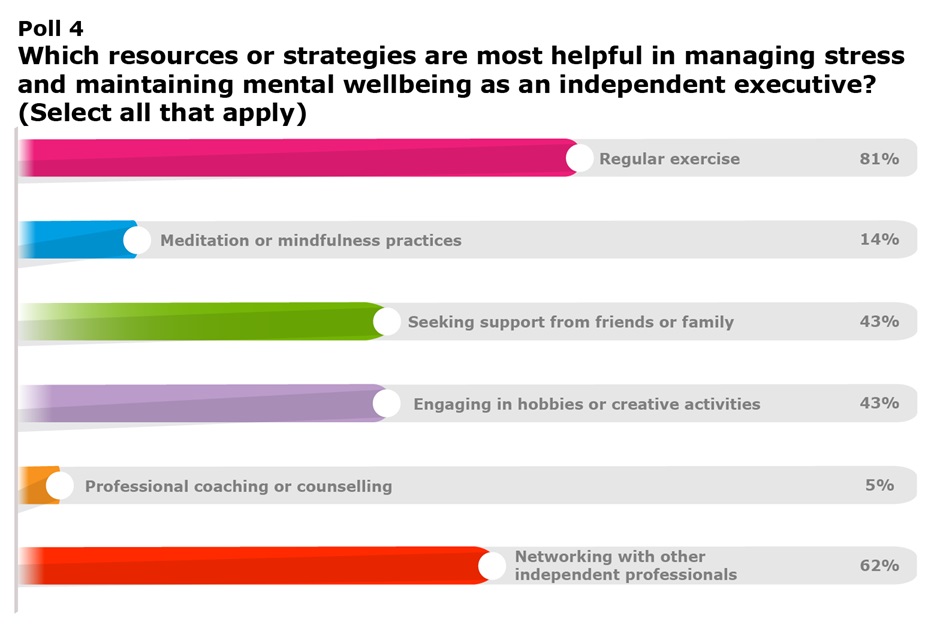Exploring mental wellness for independent executives post-pandemic: personal strategies, support networks, and emerging approaches to maintain mental health in high-pressure roles.
The UK Interim Management team decided to focus on mental wellness for this quarter’s Boyden Brief. We explored the practices and resources that independent executives employ to manage their mental wellness in the post-pandemic landscape. We discussed personal strategies, the role of support networks, and emerging approaches to maintaining mental health in high-pressure roles.
In today's fast-paced business world, the mental wellbeing of executives is increasingly recognised as a critical factor in both personal and organisational success. Deloitte's annual Workplace Wellbeing report shows that 82% of executives believe their company is advancing human sustainability, but only 56% of workers agree.
According to the findings, there are other gulfs in understanding: Around 90% of executives believe working for their company has a positive effect on worker wellbeing, skills development, career advancement, inclusion and belonging, and their sense of purpose and meaning; only 60% of workers agree.
Further, executives appear to be mostly unaware of their workforce's health: 84% believe their workers' physical health is "excellent" or "good," and 78% believe their mental health is "excellent" or "good," while only 68% of the workers themselves agree about the state of their physical health and 57% agree about their mental health.
The challenges can be even more pronounced for independent executives and interim managers. Balancing the demands of an independent career while ensuring mental health is preserved requires effective strategies and support systems. The isolation often associated with independent roles and the pressure to consistently deliver results in new environments can significantly impact one's mental wellbeing.
Market Overview
We started the call with a market update. Expectations for increased activity in private equity (PE) this year were high; with predictions that improved liquidity would lead to more movement within the portfolio businesses. Some activity has occurred, but even experienced professionals in the sector have faced challenges despite there being some signs of improvement.
The technology sector has been relatively active, particularly in Q1, showing more demand than the previous year, especially in finance functions.
Finance roles have been in high demand across sectors, with many clients looking to reposition their fee structures, therefore we are seeing the pricing element of many roles becoming more prevalent.
With over 50% of the attendees struggling to find a balance between work and personal life, we discussed and heard some practical suggestions, especially when in between assignments.
“A lot of us have great remote working facilities– but missing that contact with others. A co-working environment is important even if it is working in a coffee shop.”
Poll Questions
As is tradition with the Boyden Brief, we posed various poll questions to the interim management community, here is our analysis of the discussion:
The poll results show that most (90%) of independent executives prioritise daily or weekly self-care activities, with an equal split between these frequencies. Only a small percentage rarely engage in self-care, indicating a solid awareness of mental wellbeing among this group.

“Always think before taking a break – always wrestle with this idea. You need to carve enough time for family/yourself and be strict with it.”
For this poll question we allowed multiple responses. The poll results indicate that balancing work and personal life is the most significant challenge for independent executives, with 52% selecting this option. Isolation and lack of social interaction are the second most common challenges, at 33%, while managing workload/deadlines and dealing with rejection/setbacks are also notable concerns.

For this poll question we allowed multiple responses. The poll results reveal a mixed perception of online communities and peer networks for mental wellbeing support among independent executives. Only 34% find this type of support somewhat or very effective. Notably, 43% of respondents see these online resources as not very or not at all effective, suggesting a potential gap in the current digital support systems for interims.
“Interim is not for everyone because you have to be okay with uncertainty. You might have a long gap, and some things might work, and some might not. Advice to deal with panic: keep talking to people and keep healthy (in good shape mentally and physically).”

“I love stretching, meditation, yoga - whatever it takes to switch off!”
For this poll question we allowed multiple responses. These results highlight that regular exercise is overwhelmingly the most popular strategy for managing stress and maintaining mental wellbeing, with 81% of respondents selecting this option. Networking with other independent professionals is the second most common approach at 62% while seeking support from friends or family and engaging in hobbies or creative activities are tied for third place at 43% each, indicating a diverse range of coping mechanisms employed by this group.

Conclusion
Our poll results reveal both encouraging trends and areas for improvement in how interim managers approach their mental wellbeing.
Key takeaways:
- Self-care is a priority: 90% of respondents engage in daily or weekly self-care activities.
- Online communities and forums are useful tools for some but in-person support for interims is key.
- Exercise is the go-to stress management tool: 81% rely on regular physical activity to maintain mental wellness.
- Support systems need enhancement: The effectiveness of online communities and peer networks for mental wellbeing support is mixed, indicating a need for more tailored resources.
Moving forward, we encourage interim managers to:
- Establish non-negotiable self-care routines
- Actively seek out peer support and networking opportunities
- Explore professional coaching or mentoring relationships
For organisations working with interim managers:
- Recognise the unique pressures faced by independent executives
- Provide access to mental wellness resources as part of your engagement package
- Foster a culture that values and supports mental wellbeing.
Enhance your mental wellness strategies and support systems. Contact the UK Interim team today to learn more about our resources and how we can support your mental health journey.









